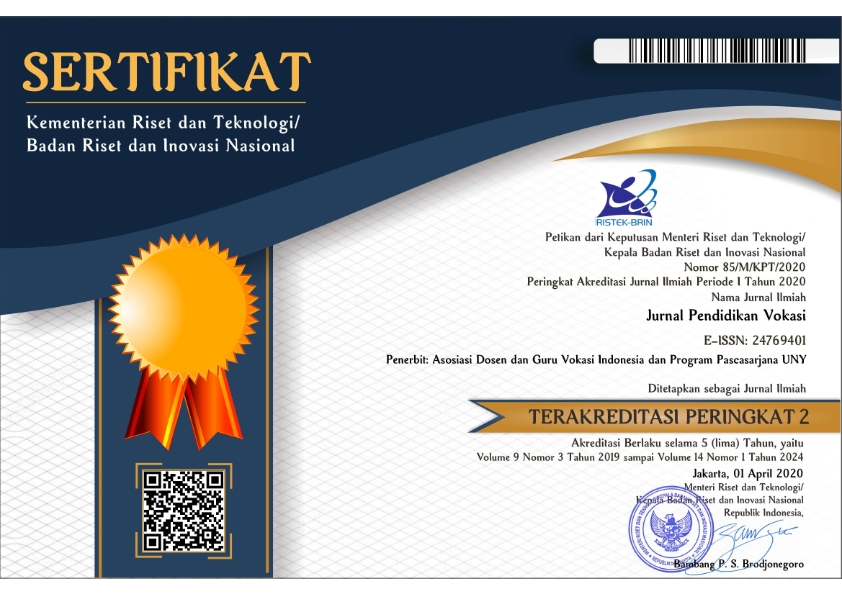The future orientation for novice teacher induction program in vocational education
DOI:
https://doi.org/10.21831/jpv.v8i1.14758Keywords:
novice, teacher induction, future, vocational educationAbstract
This paper presents the discussion with purpose to identify the orientation of teacher induction program in vocational education that is in line with changing times and future challenges. The problems associated with the teacher induction program in vocational education are whether the program has been oriented towards changes and future challenges. This research was conducted explanatory sequential mixed method approach. This study applies a six-step on research procedure. Respondents consisted of 52 novice teachers, 115 mentors, 15 principals, and 24 school supervisors. The subject of the qualitative research was nine resources persons. The respondents were given a Likert scale questionnaire to gather opinions and to be interviewed about the implementation of induction programs in vocational schools. Data were analyzed using PASW-18 and Atlas.ti software. The results of the study indicate that the future orientation of the induction program for novice vocational teachers involves many aspects in teacher professional development. These aspects include understanding of new target groups, developing job markets, technological developments, business/industry cooperation, regional development, new learning paradigms, and vocational education policy.
References
CERI. (2009). Innovation in education and vocational education and training. Included in: Working out change systemic innovation in vocational education and training. Paris: OECD Publishing.
Chong, S. (2011). Development of teachers' professional identities: From pre-service to their first year as novice teachers. KEDI Journal of Educational Policy, 8(2), 219–233.
Cooper, B. J. (2013). The impact of a comprehensive induction program to reduce the attrition rate of novice teachers. Walden University. Retrieved from http://gradworks.umi.com/36/00/3600073.html
Creswell, J. W. (2013). Research design: pendekatan kualitatif, kuantitatif, dan mixed (Terjemahan Achmad Fawaid). Yogyakarta: Pustaka Pelajar
Creswell, J. W., Klassen, A. C., Clark, V. L. P., & Smith, K. C. (2011). Best practices for mixed methods research in the health sciences. Lincoln: Office of Behavioral and Social Sciences Research
Creswell, J. W. (2014). Research design: qualitative, quantitative, and mixed methods approaches (4th ed.). Thousand Oaks, CA: Sage Publications, Inc.
Flick, U. (2009). An introduction to qualitative research. Los Angeles: Sage Publicati-ons, Inc.
Isaac, S., & Michael, W. B. (1984). Handbook in research and evaluation (2nd ed.). San Diego, CA: Edits Publishers.
Ivankova, N.V., Creswell, J.W. & Stick, S.L. (2006). Using mixed-methods sequential explanatory design: From theory to practice. Field Methods, 18(1), 3-20. DOI: 10.1177/1525822X05282260. Sage Publications.
Kemmis, R. B., & Green, A. (2013). Vocational education and training teachers' concept-ions of their pedagogy. International Journal of Training Research, 11(2), 102–121.
Markovic, J., & Axmann, M. (2006). "Vocational pedagogy" in vocational education teacher training (Vol. Vocational Education and Training Reform Programme). Belgrade: Ministry of Education and Sports Republic of Serbia.
Marsiti, C. I. R. (2011). upaya peningkatan mutu pendidikan sekolah menengah kejuruan melalui pengembanagan profesionalisme guru. Jurnal Pendidikan Vokasi, 1(1), 157-168. Retrieved from https://journal.uny.ac.id/index.php/jpv/article/view/5810
Martawijaya, D. (2011). Pengembangan program pendidikan guru pendidikan teknologi dan kejuruan Trans Nasional. Jurnal Pendidikan Vokasi, 1(1), 91-112. Retrieved from https://journal.uny.ac.id/index.php/jpv/article/view/5802
Miles, Matthew B., A. Michael Huberman, & Johnny Saldaña. (2014). Qualitative data analysis: A methods sourcebook (3rd edition). Thousand Oaks CA: SAGE Publications, Inc.
Pacific Policy Research Center. (2010). 21st Century Skills for Students and Teachers. Honolulu: Kamehameha Schools, Research & Evaluation Division.
Prosser, C. A., & Quigley, T. H. (1949). Vocational education in a democracy. Chicago, IL: American Technical Society.
Scott, D. & Usher, R. (2011). Researching Education: Data, Methods and Theory in Educational Enquiry- 2nd ed. London: Continuum International Publishing Group.
Steele, T. E. (2013). An investigation of the perceptions of induction support of first year alternatively certificated teachers (Dissertations, and Capstone Projects. Paper 583.). Kennesaw State University, Kennesaw, GA. Retrieved from http://digitalcommons.kennesaw.edu/etd/583
Stingu, M. (2013). Induction of newly qualified teachers: Limits, needs and opportunities. The Journal of Education Culture and Society, (1), 148–157.
Wong, H. K. (2005). New teacher induction: The foundation for comprehensive, coherent, and sustained professional development. In Teacher mentoring and induction: The state of the art and beyond, By Hal Portner (pp. 41–58). Thousand Oaks, CA: Corwin Press.
Downloads
Published
How to Cite
Issue
Section
License
The authors submitting a manuscript to this journal agree that, if accepted for publication, copyright publishing of the submission shall be assigned to Jurnal Pendidikan Vokasi. However, even though the journal asks for a copyright transfer, the authors retain (or are granted back) significant scholarly rights.
The copyright transfer agreement form can be downloaded here: [JPV Copyright Transfer Agreement Form]
The copyright form should be signed originally and sent to the Editorial Office through email to jpvokasi@uny.ac.id
Jurnal Pendidikan Vokasi by http://journal.uny.ac.id/index.php/jpv is licensed under a Creative Commons Attribution-ShareAlike 4.0 International License.














